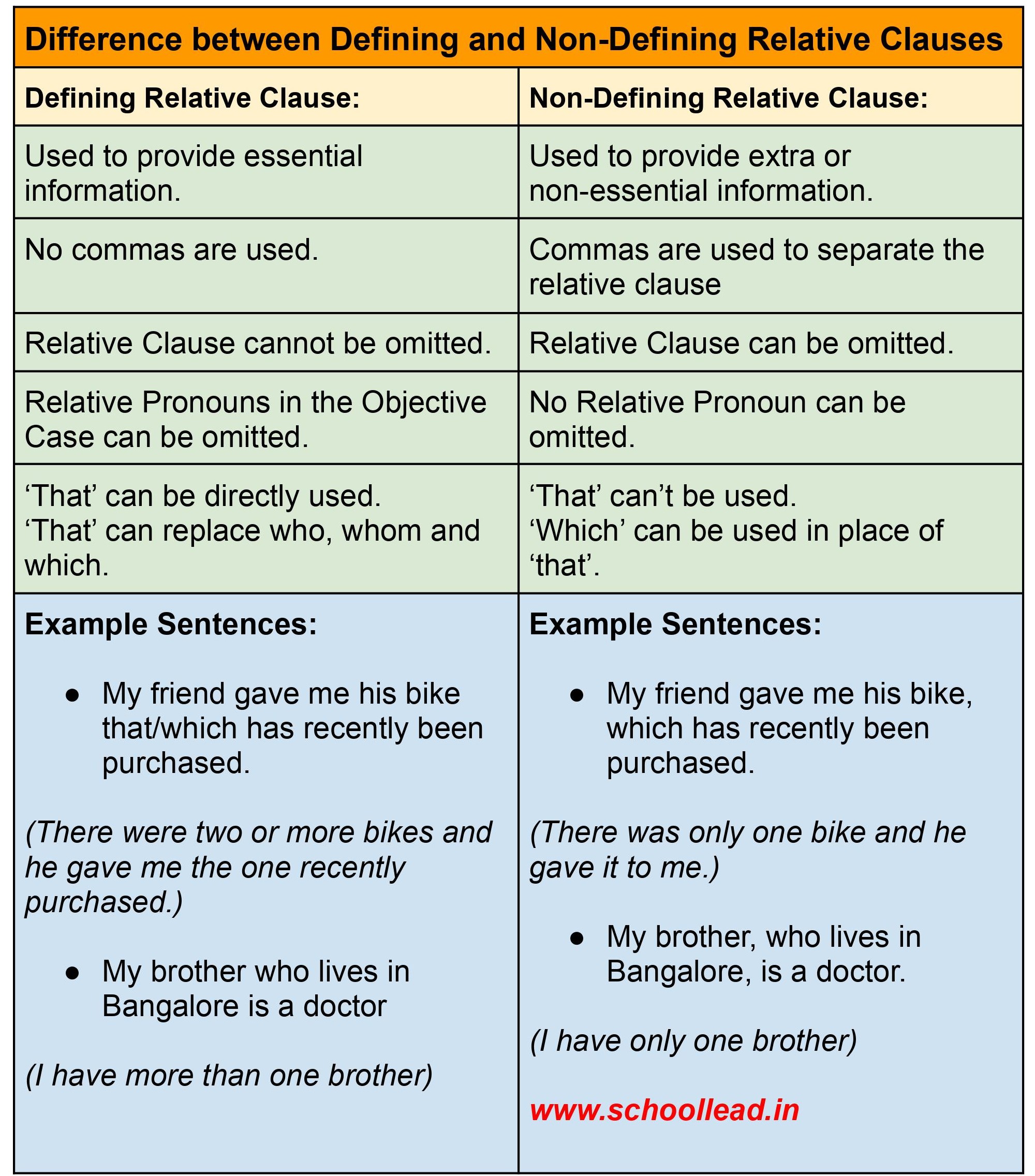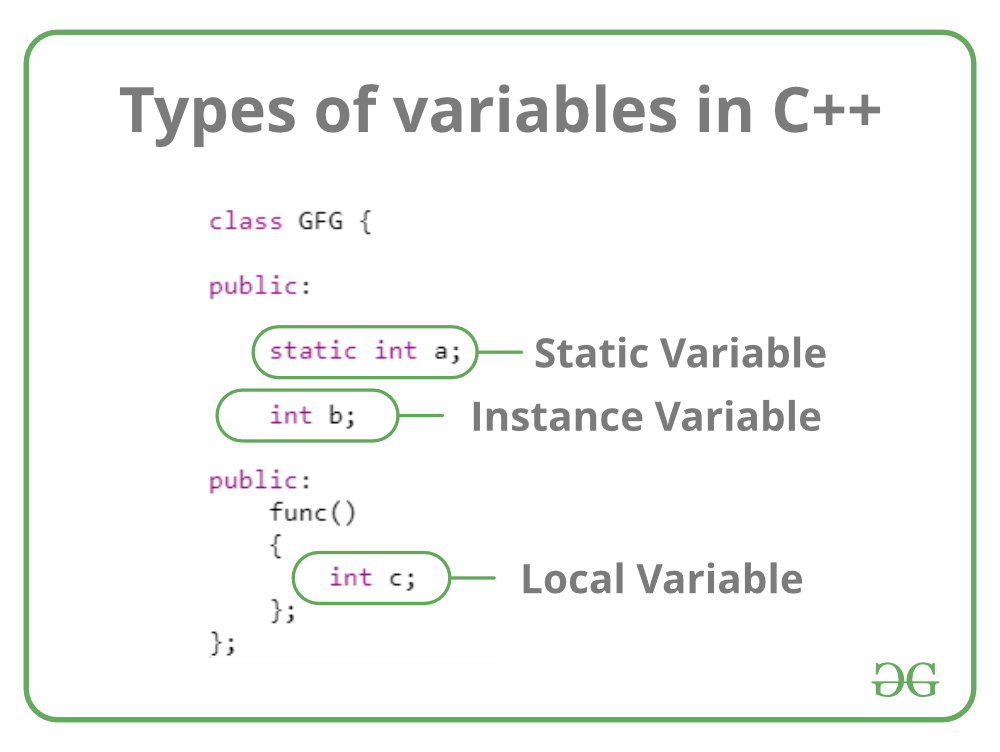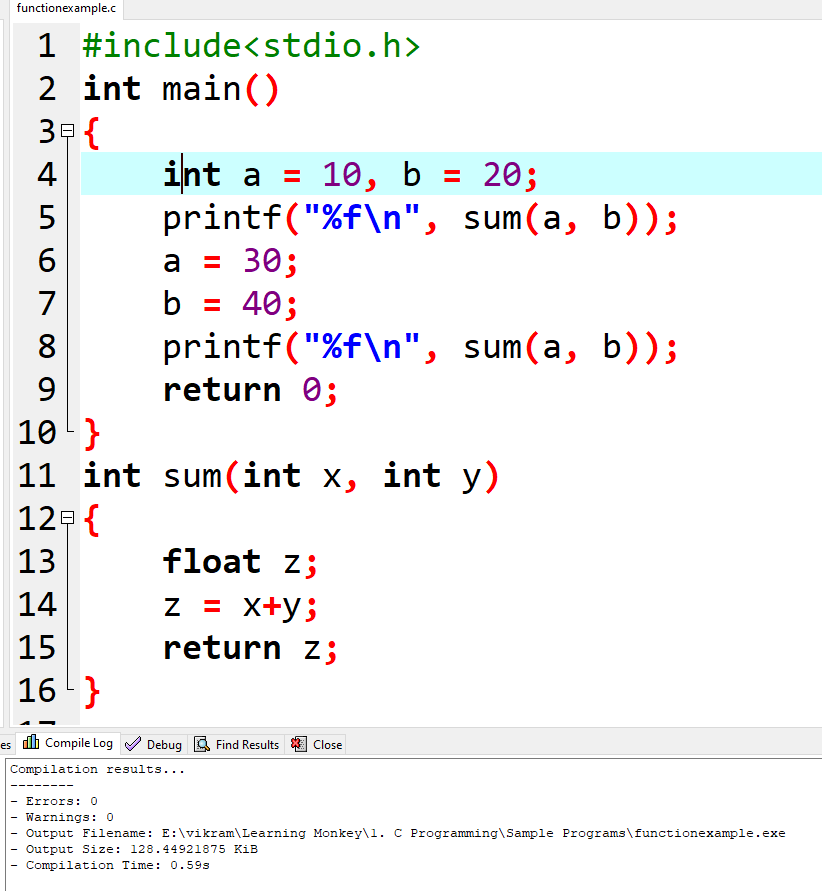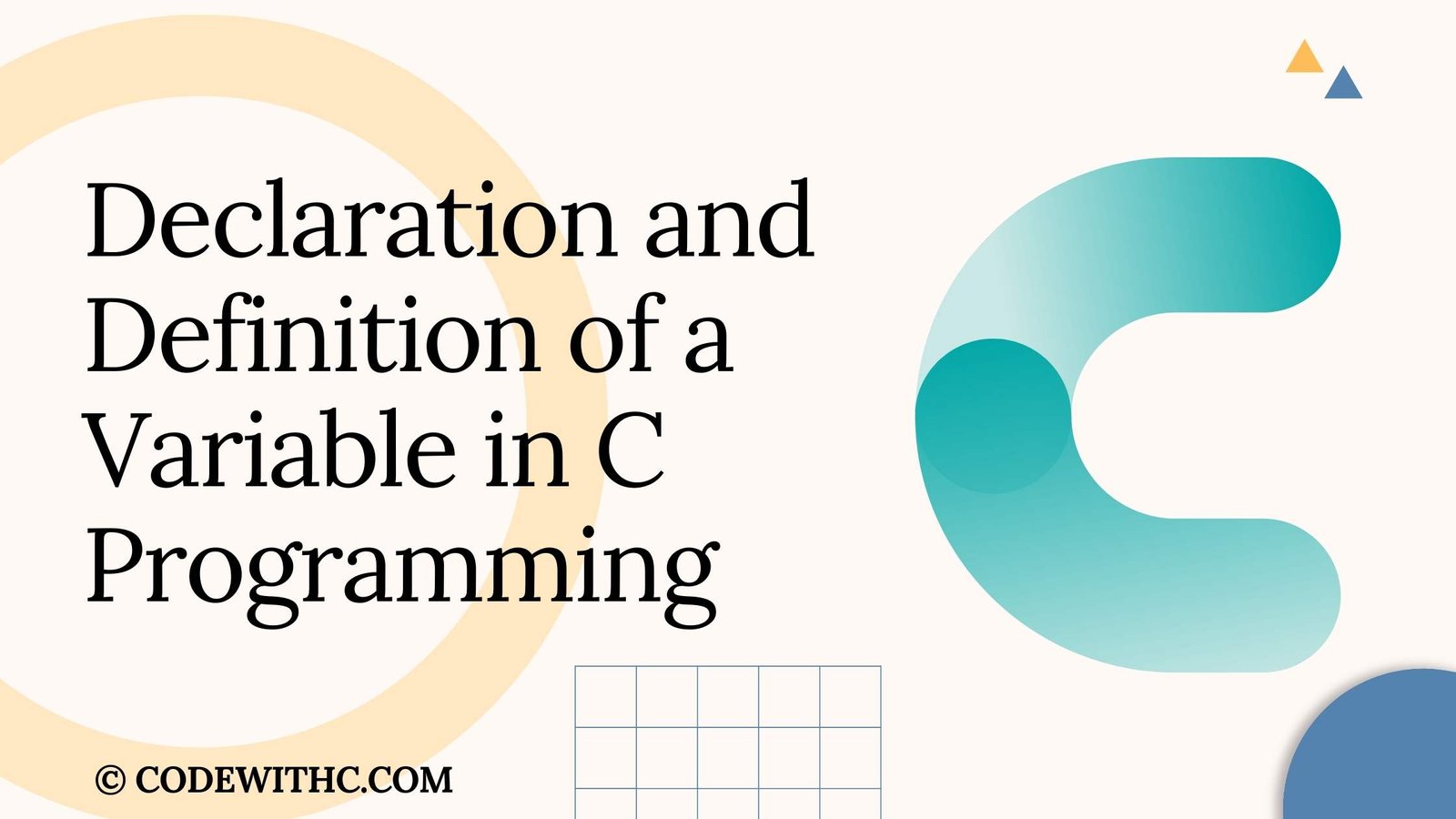C Declaring Vs Defining _ C Declarations and Definitions
Di: Luke
Key Differences.
Definition vs Declaration vs Initialization in C/ C++
What is ‚declare‘ vs ‚define‘ vs ‚initialize‘, regarding variables, and what are each’s effect on lvalue & rvalue? Question Limited to ‚int‘ to keep this as simple as possible. Juli 2016What is the difference between a definition and a declaration?10. In C++ const have internal linkage by default and there’s no point in declaring them static. So the first two lines are not needed.The two most common ways would to either be: Preprocessor Macros: #define BOOL unsigned char. where the word definition is used, it is used to mean the same thing as declaration. Eine Konstantenvariable muss definiert werden, d.

When you declare something, you are making a formal announcement or stating something explicitly, often in a public or legal context.What It Means to Declare Something in C and C++
Difference between Definition and Declaration
Declaring a value–without . 1) Regular function declarator syntax.Furthermore, it is possible to declare and define functions. Or typedefs: typedef BOOL unsigned char; So I was wondering what the exact benefits and trade-offs of using either preprocessor macros or typedefs are? I commonly find myself making datatypes like uint16, (for unsigned .Consider this small example. Aug 25, 2009 at 20:15.Declaring a variable is like telling the (javascript) compiler that this token x is something I want to use later.A declaration specifies a unique name for the entity, along with information about its type and other characteristics. One refers to the existence . Here variable “a” is described as an int to the compiler and memory is allocated to hold value 10. In a statically typed language like Java, this also means that the declared type of the variable is determined. Use in the header. With the help of the responses here and talking to a few friends here is the practical example of a use of extern. We can say “Definition = Declaration + Space reservation”.structattr-spec-seq (optional)name.Declaration of a variable is for informing the compiler of the following information: name of the variable and the type of the value it will hold i. On the other hand, define involves setting clear .In Zeile 21 wird die Klasse C sowohl deklariert als auch definiert (obwohl die Klasse wie definiert nichts tut).The most common value is Log.No space is reserved in memory for any variable in case of declaration. Also, macro’s are preprocessor directives, their values cannot be changed like variables. You can instead use the strcpy() function, which stands for string copy.As written in C Standard, a declaration specifies the interpretation and attributes of a set of identifiers and a definition for an object, causes storage to be reserved for that . In fact, from an allocation perspective, it is (nearly) the same as declaring the variable at the beginning of the function.What it Means to Declare Something in C and C++. When you declare a variable it means that you are declaring a name for the variable. However, I suspect that any such code is not as cleanly organized as it .Last Updated : 14 Jul, 2023. In C programming, #define is a preprocessor directive that is used to define macros. answered Jan 20, 2020 at 11:59. Consider the following code snippet, where you have two constants STUDENT_ID and COURSE_CODE. When you declare a variable, a function, or even a class all you are doing is saying: there is something with this name, and it has this type. So it is really about const vs.That method is quite cumbersome, time-consuming, and error-prone, though. Best practice is to use constants as much as possible, and use #define only when you really need a macro, not just a named literal value.Declaring – Declaring a variable means to introduce a new variable to the program. Instantiate – Instantiating a class means to create a new instance of the class.
What is the Difference Between Declaration and Definition in C
If you are learning “ C programming “, it is very important to understand the difference between . Can also be All. A declaration introduces an identifier and describes its type, be it a type, .And a definition is basically everything the compiler needs in order to create an instance of that class / object / struct / variable etc. Maximum verbosity level to allow when compiling. It’s the extern in the header that you #include that provides access to the variable, not the #include itself.

A better description of this can be found here and here. Declaration vs Definition.In fact, in C in most cases you should prefer #define, but in this specific case (state machine) enum is indeed a better approach.A function declaration looks like the start of a function definition. int number = 5; num is a macro and number is a global variable.A declaration defines a variable and it is also known as a statement. Example 1 – to show a pitfall: stdio. To use this function, you have to include the #include line after the #include line at the top of your file. “Define”, on the other hand, not only declares the variable but also allocates memory for it. It definitely is not the preferred way.
Whats’s difference between declaring and defining variables?
In C++ the point at which a name is declared is . #include header. //declare a class and declare it’s members. it is undefined. März 2009c++ – The differences between initialize, define, declare a . This is called scope and the concept applies to more than just main function. 2009What exactly are C++ definitions, declarations and assignments?22. Understanding Declaration and Definition.Hier diskutieren wir nur die Unterschiede, aber wenn Sie gerade erst angefangen haben, das „C“ zu lernen, und noch keine Kenntnisse haben, können Sie den Blogbeitrag . MyObject x = new MyObject(); //we are making a new instance of the class MyObject. Defining a variable means declaring it and also allocating space to hold it.extern tells the compiler that this data is defined somewhere and will be connected with the linker. Defining is telling the compiler that this is a variable.comEmpfohlen auf der Grundlage der beliebten • Feedback


DECLARE_LOG_CATEGORY_EXTERN(MyLogCategory, Log, All); // Place this in a header file and include it to reuse a log category between multiple . (though these can sometimes be omitted). The decl-specifier-seq in this case must contain the keyword auto.
Declaring variables inside loops, good practice or bad practice?
The concept of a ‚declaration‘ as a soft/forward definition is . file-scope) constants, not about class members. The only difference is the scope: the variable cannot be . var x; defining it means to give it a value which you can either do it like: x = 10; // defining a variable that was declared previously
macros
Two functions can have the same name but different parameters. const u32 g_my_const= 10U; As it was already mentioned in a comment by @Thomas Jager to your question you can use standard aliases for types by means of . extern const u32 g_my_const; In this case this will be only a declaration of the constant and in the c module there will be its definition. One important difference is that num is not stored in the memory, num is just the substitute for 5, but number uses memory. “Declare” is used to tell the program that a variable exists and what type it is, but it does not allocate any memory for the variable.If it does support C99, you can declare the variable where you need it and initialize it when you declare it. A declaration introduces a new identifier into a program’s namespace.

A declaration is a C language construct that introduces one or more identifiers into the program and specifies their meaning and properties. The macros are the identifiers defined by #define which are replaced by their value before compilation. Therefore it’s a useful tool for creating global . Declaring a variable outside main function means that variable is global, while the one declared inside main is local. This action can involve proclaiming laws, intentions, or conditions, and is about communication or proclamation of a status or stance.Declaring is telling the compiler that there’s a variable out there that looks like this.It’s common practice to put extern declarations in the header file for a code module and #include the header to get those declarations instead of declaring them yourself.The main difference between Declaration and Definition in C is that declaration of a variable indicates the compiler about the name and the type of the variable, while the . When it comes to such constants in C++ static const is redundant. duplicate of something as far as I can remember. Jun 28, 2010 at 17:57. The main difference between Declaration and Definition in C is that declaration of a variable indicates the compiler about the name and the type of the variable, while the definition of a variable indicates the compiler where and how much storage to create for a variable. The generics in C are also implemented using the #define . // Valid verbosity levels are: Fatal, Error, Warning, Display, Log, Verbose, VeryVerbose. It does point to a location in memory, but it does not yet contain a value. Weitere Ergebnisse anzeigenWhat is the difference between a definition and a declaration?stackoverflow. Constants allow you to specify a datatype, which is (usually) an advantage. Function declarations describe the name, number and types of parameters and the return type.Declaring a variable means the first “mention” of the variable, which tells the compiler “Hello, I am here and can be used”.How to Declare Constants Using #define Example.
Differences Between Definition, Declaration, and Initialization

C – Declaration vs Definition. Macros are much more flexible, and therefore can get you into much more trouble if you’re not careful. If you define something more than once, then the linker doesn’t know which of the definitions to link references to and complains about duplicated symbols. You can use these values throughout your entire code, but you cannot change their values. Exception: extern int i = 0; /* .Your first two lines declare functions with a different signature (no parameters) to those you later declare.Maybe the spec for states in a state machine, changes it a bit, but there’s no reason to consider a state of .
C Declarations and Definitions
– Michael Carman.Difference between Definition and Declaration (Declare vs Define in C) – Aticleworld.


Definition vs Declaration vs Initialization in C/ C++.comDifference Between Definition and Declarationtechdifferences. class X { //declares X and starts to define it.C Declarations and Definitions.For question #2: The variable is allocated once, when the function is called.A function declaration at class scope introduces a class member function (unless the friend specifier is used), see member functions and friend functions for details.While both terms are related to creating variables, they have different meanings. If it’s C++, you should use the C++ Standard Library’s std::string. 2) If used on a line of its own, as in structname;, declares but doesn’t define the struct name (see forward declaration below)., declaration . We can define constants and functions like macros using #define. – AnT stands with Russia. int a; //a is declared. The compiler can then handle most (but not all) uses of that name without needing the full definition of that name. The only excuse I can think of for not doing that would be because you need to declare it but do an early exit before using it, so the initializer would be wasted. You define its type and its name.
Declarations
2) Trailing return type declaration.c – Struct declaration versus definition4.
Function declaration
Deklarationen und Definitionen (C++)
C++ C Programming Software Engineering.If you forget to define something that’s been declared and referenced somewhere, then the linker doesn’t know what to link references to and complains about a missing symbols.A function consist of two parts: Declaration: the function’s name, return type, and parameters (if any) Definition: the body of the function (code to be executed) void myFunction () { // declaration. The value itself is not determined during the declaration. The identifier can refer to a variable, a function, a type, a class, or any other . It’s much more clear than a preprocessor macro, it will have a single location in memory when it’s defined, and it has all the extra functionality of std::string instead of only pointer comparisons as is the case with the implicit const char* that are created with a . function name, followed by argument declarations in parentheses. In c++ many times a class declaration can also be a definition or partial definition/. A declaration establishes an association between a particular variable, function, or type and its attributes. In other contexts, names the previously-declared struct, and attr-spec-seq is not allowed. Plus only the technically correct terminology, not any common/casual (mis)usages of terms if any. // the body of the function (definition) } For code optimization, it is recommended to separate the declaration and the definition of the function. (2) 1) Struct definition: introduces the new type struct name and defines its meaning.h: int errno; myCFile1.If this is a C++ question and it mentions #define as an alternative, then it is about global (i. Open-Source Internship opportunity by OpenGenus for programmers.
- Cadillac Celestiq 2024 – Cadillac Celestiq (2023): Superexklusive Elektro-Limousine
- Busverbindung Osnabrück Bremen
- Buttercreme Selbst Machen – Hautcremes einfach selber machen
- C4Eva Xbox One | TX Members Arrested : r/SwitchPirates
- Bwt Aqa Perla Kosten : BWT Perla seta
- Butternuss Kürbis Schneiden : Kürbis schälen » Mit diesen Methoden geht’s am besten
- C Getchar Anleitung – Verwendung der getchar-Funktion in C
- Cachectic : Cachectic Definition & Meaning
- Bwl In Der Medizin | BWL im Krankenhaus für Ärztinnen und Ärzte
- Byzantinische Währung Geschichte
- C House Bad Dürkheim : Cases